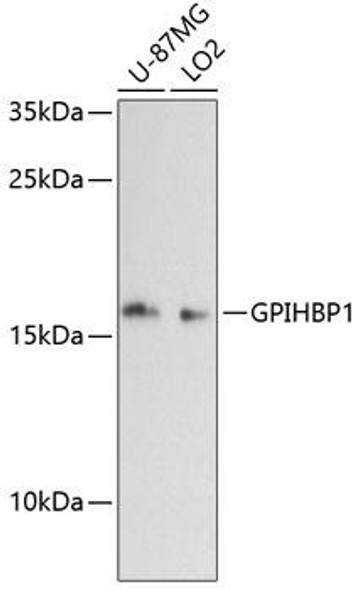Description
Gpi Antibody (PACO27149)
The GPI Antibody (PACO27149) is a highly specific and reliable tool for research involving Glycosylphosphatidylinositol (GPI)-linked proteins. This polyclonal antibody, raised in rabbits, is specifically designed for use in Western blot applications with human samples. GPI-linked proteins play essential roles in cell signaling, cell adhesion, and immune response regulation. The GPI Antibody binds specifically to GPI-linked proteins, enabling researchers to detect and analyze these critical molecules in a variety of cell types.
This makes it an ideal tool for studies in immunology, cell biology, and cancer research.Understanding the functions and mechanisms of GPI-linked proteins is crucial for advancing our knowledge of cellular processes and developing targeted therapies for diseases related to dysregulation of these proteins. The GPI Antibody provides researchers with a valuable tool for investigating the roles of GPI-linked proteins in various physiological and pathological conditions.
| Antibody Name: | Gpi Antibody (PACO27149) |
| Antibody SKU: | PACO27149 |
| Size: | 50ug |
| Host Species: | Rabbit |
| Tested Applications: | ELISA |
| Recommended Dilutions: | |
| Species Reactivity: | Mouse |
| Immunogen: | Recombinant Mouse Glucose-6-phosphate isomerase protein (2-558AA) |
| Form: | Liquid |
| Storage Buffer: | Preservative: 0.03% Proclin 300 Constituents: 50% Glycerol, 0.01M PBS, PH 7.4 |
| Purification Method: | >95%, Protein G purified |
| Clonality: | Polyclonal |
| Isotype: | IgG |
| Conjugate: | Non-conjugated |
| Background: | Besides it's role as a glycolytic enzyme, mammalian GPI can function as a tumor-secreted cytokine and an angiogenic factor (AMF) that stimulates endothelial cell motility. GPI is also a neurotrophic factor (Neuroleukin) for spinal and sensory neurons. |
| Synonyms: | Glucose-6-phosphate isomerase (GPI) (EC 5.3.1.9) (Autocrine motility factor) (AMF) (Neuroleukin) (NLK) (Phosphoglucose isomerase) (PGI) (Phosphohexose isomerase) (PHI), Gpi, Gpi1 |
| UniProt Protein Function: | G6PI: belongs to the GPI family whose members encode multifunctional phosphoglucose isomerase proteins involved in energy pathways. A dimeric enzyme that catalyzes the reversible isomerization of glucose-6-phosphate and fructose-6-phosphate. Functions in different capacities inside and outside the cell. In the cytoplasm, the gene product is involved in glycolysis and gluconeogenesis, while outside the cell it functions as a neurotrophic factor for spinal and sensory neurons. Defects in this gene are the cause of nonspherocytic hemolytic anemia and a severe enzyme deficiency can be associated with hydrops fetalis, immediate neonatal death and neurological impairment. |
| UniProt Protein Details: | Protein type:Carbohydrate Metabolism - amino sugar and nucleotide sugar; Carbohydrate Metabolism - glycolysis and gluconeogenesis; Carbohydrate Metabolism - starch and sucrose; Apoptosis; Cytokine; Carbohydrate Metabolism - pentose phosphate pathway; EC 5.3.1.9; Isomerase Cellular Component: cytoplasm; cytosol; membrane; myelin sheath; neuron projection; nucleoplasm; plasma membrane Molecular Function:glucose-6-phosphate isomerase activity; intramolecular transferase activity; monosaccharide binding; protein binding; ubiquitin protein ligase binding Biological Process: aldehyde catabolic process; carbohydrate metabolic process; erythrocyte homeostasis; glucose 6-phosphate metabolic process; glucose homeostasis; glycolysis; in utero embryonic development; mesoderm formation; methylglyoxal biosynthetic process; negative regulation of caspase activity; negative regulation of neuron apoptosis; response to morphine |
| NCBI Summary: | This gene encodes a member of the glucose phosphate isomerase protein family. The encoded protein has been identified as a moonlighting protein based on its ability to perform mechanistically distinct functions. In the cytoplasm, the gene product functions as a glycolytic enzyme (glucose-6-phosphate isomerase) that interconverts glucose-6-phophsate and fructose-6-phosphate. Extracellularly, the encoded protein (also referred to as neuroleukin) functions as a neurotrophic factor that promotes survival of skeletal motor neurons and sensory neurons, and as a lymphokine that induces immunoglobulin secretion. The encoded protein is also referred to as autocrine motility factor based on an additional function as a tumor-secreted cytokine and angiogenic factor. [provided by RefSeq, Jan 2014] |
| UniProt Code: | P06745 |
| NCBI GenInfo Identifier: | 146345422 |
| NCBI Gene ID: | 14751 |
| NCBI Accession: | P06745.4 |
| UniProt Secondary Accession: | P06745,O89062, Q3TEE7, Q3TW50, Q3UUX1, Q3UY84, Q3UZJ1 Q5RJI3, Q8C675, Q9JM07, |
| UniProt Related Accession: | P06745 |
| Molecular Weight: | 62,767 Da |
| NCBI Full Name: | Glucose-6-phosphate isomerase |
| NCBI Synonym Full Names: | glucose phosphate isomerase 1 |
| NCBI Official Symbol: | Gpi1 |
| NCBI Official Synonym Symbols: | MF; NK; Amf; Gpi; Nlk; Org; Pgi; Phi; Gpi-1; Gpi1s; Gpi-1r; Gpi-1s; Gpi-1t; Gpi1-r; Gpi1-s; Gpi1-t; NK/GPI |
| NCBI Protein Information: | glucose-6-phosphate isomerase |
| UniProt Protein Name: | Glucose-6-phosphate isomerase |
| UniProt Synonym Protein Names: | Autocrine motility factor; AMF; Neuroleukin; NLK; Phosphoglucose isomerase; PGI; Phosphohexose isomerase; PHI |
| Protein Family: | GPI-anchored protein |
| UniProt Gene Name: | Gpi |
| UniProt Entry Name: | G6PI_MOUSE |









